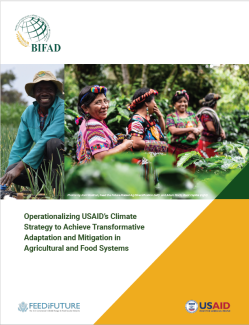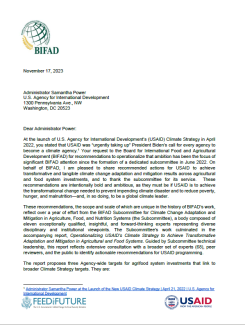BIFAD formally transmitted the commissioned report, Operationalizing USAID’s Climate Strategy to Achieve Transformative Adaptation and Mitigation in Agricultural and Food Systems, to USAID Administrator Samantha Power on November 17th, 2023.
The Board for International Food and Agricultural Development (BIFAD)-commissioned report, Operationalizing USAID’s Climate Strategy to Achieve Transformative Adaptation and Mitigation in Agricultural and Food Systems, is now available.
The report presents six detailed operational and technical recommendations and targets for adaptation, mitigation, and finance in agrifood systems that align with those of USAID’s 2022–2030 Climate Strategy. The recommendations are intended to help USAID accelerate achievement of its ambitious Climate Strategy goals within agrifood systems programming. The BIFAD Subcommittee on Systemic Solutions for Climate Change Adaptation and Mitigation in Agricultural, Nutrition, and Food Systems, a group of eleven experts, spent a year developing the report.
The recommendations stem from multidisciplinary evidence gathering and independent expert consultations led by the BIFAD Subcommittee, in addition to broad feedback at BIFAD public meetings. Here's a glimpse of what the report has to offer, structured around three strategic elements:
Image  | Targets: The report recommends specific agrifood system targets aligned with the Climate Strategy, focusing on adaptation, mitigation, and finance. These targets aim to improve the climate resilience of millions of people reliant on agriculture, reduce emissions, and mobilize substantial finance for climate change adaptation and mitigation. |
Image  | USAID Operational Changes: To effectively operationalize the Climate Strategy within USAID's agricultural and food security portfolio, the report presents five organizationally tailored recommendations. These changes will better position USAID to achieve Climate Strategy objectives. They include setting, measuring, and reporting on climate targets; integrating climate objectives into the program cycle; building climate expertise; increasing climate investment; and funding climate research. |
Image  | High-Potential Leverage Points: The report identifies high-potential leverage points within agrifood systems to drive transformative shifts toward net-zero emissions and climate-resilient pathways while achieving food security goals.
|
BIFAD looks forward to the practical implementation of these recommendations for a climate-resilient future in agrifood systems.
Recommended Citation: Carr E.R., Diro R., Naeve K., Hamel R., Beggs M., Benson C.N, Caldwell, B., Mbevi L., Hall T., Zook D., Aldredge H., Liming K., Allognon L., Crocker T., and Mukupa N. (2023). Operationalizing USAID’s Climate Strategy to Achieve Transformative Adaptation and Mitigation in Agricultural and Food Systems. Tetra Tech under the USAID BIFAD Support Contract.


